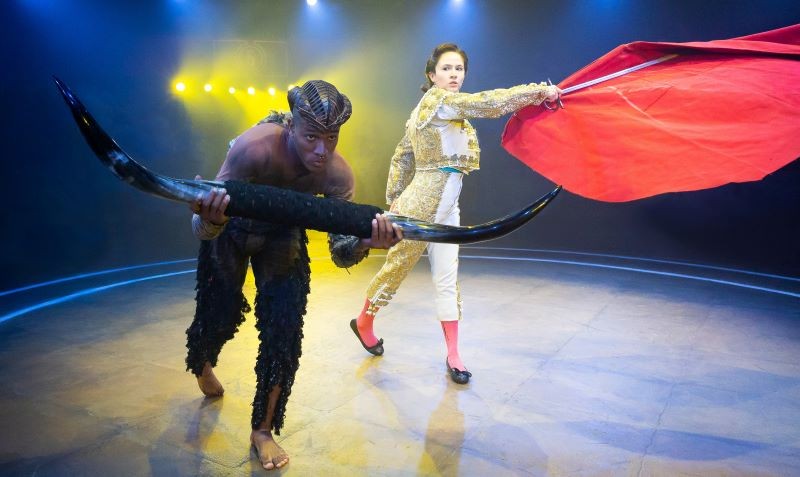Support Us
Houston's independent source of
local news and culture
account
- Welcome,
Insider - Login
- My Account
- My Newsletters
- Contribute
- Contact Us
When a Young Woman's Dream Turns to Bullfighting in Torera

Photo by Lynn Lane
One young woman's dream.
[
{
"name": "Related Stories / Support Us Combo",
"component": "11591218",
"insertPoint": "4",
"requiredCountToDisplay": "4"
},{
"name": "Air - Billboard - Inline Content",
"component": "11591214",
"insertPoint": "2/3",
"requiredCountToDisplay": "7"
},{
"name": "R1 - Beta - Mobile Only",
"component": "12287027",
"insertPoint": "8",
"requiredCountToDisplay": "8"
},{
"name": "Air - MediumRectangle - Inline Content - Mobile Display Size 2",
"component": "11591215",
"insertPoint": "12",
"requiredCountToDisplay": "12"
},{
"name": "Air - MediumRectangle - Inline Content - Mobile Display Size 2",
"component": "11591215",
"insertPoint": "4th",
"startingPoint": "16",
"requiredCountToDisplay": "12"
}
]
Nothing is ever going to change my mind about bullfighting. Not Rudolph Valentino's smolder or Tyrone Power's swagger in the silent and later sound movie versions of Vicente Blasco Ibáñez's classic Blood and Sand, or Hemingway's rhapsodic prose in his essay Death in the Afternoon or novel The Sun Also Rises. The famous July running of the bulls in Pamplona during that city's San Fermin Festival is satisfying to me only when the drunk or vain idiots running ahead of the goaded animals get gored or trampled.
I am no fan of this blood sport, not even when playwright Monet Hurst-Mendoza morphs the cruelty into a young girl's right of passage and study of empowerment in her Alley world premiere, Torera.
Staged with all the panache and finesse of any fine Alley production, with evocative costumes by Rodrigo Muñoz (the matadors' “suits of lights” are bedazzling), a symbolic suspended wooden corrida by designer Marcelo Martínez García, piercing side light from Yuki Nakase Link, and subtly effective direction from Tatiana Pandiani, the play is coldly ineffective as it bypasses the blood lust of the Roman circus for a softer personal tale whose twists, turns and denouement we see coming before we enter the arena.
At the beginning, the play's a rom-com until the dark overtones leech in: patriarchy, rigid class status, family pride, and a social system where girls must know their place and serve their men.
Elena (a beguiling Jacqueline Guillén) is the tomboy deluxe, who climbs the orange trees in Merida, Yucatan, and dreams of fighting bulls like her father. It's in her blood, like her best bud Tanok (also beguiling, Jesse Castellanos) whose father Don Rafael, the famous rejoneador (solid and commanding Eliud Garcia Kauffman), trains his son to follow in his path. Elena and her mother Pastora (steady and sure Maria Elena Ramirez) also live in the house. Pastora is the family housekeeper and warns young Elena to curtail her wild ways and do what is expected of all girls. Elena is not going to do that. “I am a bird. I am invincible. I soar above everything,” she proclaims. (Everyone talks in this magic realism fashion.) She has set her path. She wants to kill bulls and nothing is going to stop her.
As in all bullfighting stories, things inevitably turn deadly until other personal problems arise as if Hurst-Mendoza just thought of them now instead of subtly introducing them into the drama where they should have occurred naturally. Although without an intermission, the drama prolongs the inevitable, stretching out the tale with dance sequences performed with flamenco flourish by José José Arrieta Cuesta and Carolina Ornelas (who portray symbolic bulls or horses in the practice sessions and arena sequences). They add color and sexy allure, but not much depth, although the audience applauds each exit.
Torera explores an alien world – one of immense suffering and torture for the hapless bulls bred for the fight in which there is no escape – set inside a male world where females are not encouraged or tolerated. There are, I believe, seven matadoras in the world. Women can be just as sadistic as men. If Elena wants to be a bullfighter instead of a veterinarian, or sculptor or teacher, so be it. But she shouldn't be surprised when she gets picketed by PETA.
Performances are scheduled through June 4 at 7:30 p.m. Tuesday through Thursday and Sunday; 8 p.m. Friday and Saturday; and 2:30 p.m. Saturday and Sunday at Alley Theatre, 615 Texas. For more information, call 713-220-5700 or visit alleytheatre.com $51-$74. (On May 19 and 27 (matinee) and June 3 there will be a simultaneous Spanish translation.)

